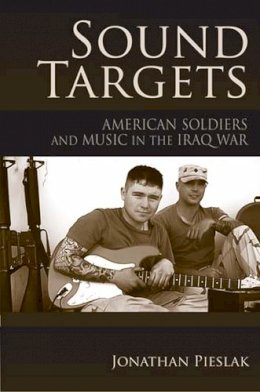
Sound Targets: American Soldiers and Music in the Iraq War
Jonathan Pieslak
Though a part of American soldiers' lives since the Revolutionary War, by World War II music could be broadcast to the front. Today it accompanies soldiers from the recruiting office to the battlefield. For this book, Jonathan Pieslak interviewed returning veterans to learn about the place of music in the Iraq War and in contemporary American military culture in general. Pieslak describes how American soldiers hear, share, use, and produce music both on and off duty. He studies the role of music from recruitment campaigns and basic training to its use "in country" before and during missions. Pieslak explores themes of power, chaos, violence, and survival in the metal and hip-hop music so popular among the troops, and offers insight into the daily lives of American soldiers in the Middle East.
Product Details
About Jonathan Pieslak
Reviews for Sound Targets: American Soldiers and Music in the Iraq War
MUSICultures
[This] book documents and explains various ways in which music is intertwined throughout the lives of many American soldiers . . . serving in Iraq. The author's purpose for this work is to offer a glimpse into these military lives and add to the literature on music and war. 13 1-2 2010
Music Reference Services Quarterly
I highly recommend this book for all those interested in relationships between artistic expression and politics, war, militarism, and psychology. Its writing style is both accessible and sophisticated, making it appropriate for use in either undergraduate or graduate courses. October, 2009
Lisa Gilman
University of Oregon
Pieslak's Sound Targets offers a serious and insightful examination of how music was used by American soldiers in the Iraq War.November 2009
Times Higher Education
All in all, the author has amassed a profusion of valuable information and data about music and the Iraq War . . . Research into music's role in armed conflict is in its infancy . . . and we are in need of the kinds of histories and contexts he establishes and the accounts he records, especially in such an eminently readable and accessible text. . . . [W]e must recognize Jonathan Pieslak for having bravely opened the door for further exploration through his pioneering study. 29:1, Spring 2011
American Music
